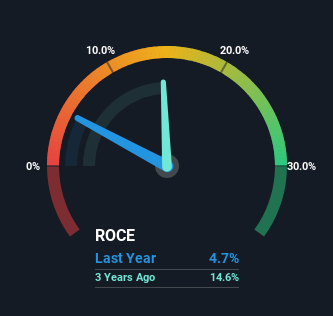Here's What's Concerning About Ningbo Exciton Technology's (SZSE:300566) Returns On Capital

What trends should we look for it we want to identify stocks that can multiply in value over the long term? Typically, we'll want to notice a trend of growing return on capital employed (ROCE) and alongside that, an expanding base of capital employed. Put simply, these types of businesses are compounding machines, meaning they are continually reinvesting their earnings at ever-higher rates of return. Although, when we looked at Ningbo Exciton Technology (SZSE:300566), it didn't seem to tick all of these boxes.
Understanding Return On Capital Employed (ROCE)
If you haven't worked with ROCE before, it measures the 'return' (pre-tax profit) a company generates from capital employed in its business. To calculate this metric for Ningbo Exciton Technology, this is the formula:
Return on Capital Employed = Earnings Before Interest and Tax (EBIT) ÷ (Total Assets - Current Liabilities)
0.047 = CN¥102m ÷ (CN¥3.9b - CN¥1.7b) (Based on the trailing twelve months to September 2023).
Thus, Ningbo Exciton Technology has an ROCE of 4.7%. In absolute terms, that's a low return and it also under-performs the Chemicals industry average of 5.9%.
Check out our latest analysis for Ningbo Exciton Technology

Above you can see how the current ROCE for Ningbo Exciton Technology compares to its prior returns on capital, but there's only so much you can tell from the past. If you'd like to see what analysts are forecasting going forward, you should check out our free analyst report for Ningbo Exciton Technology .
What Can We Tell From Ningbo Exciton Technology's ROCE Trend?
In terms of Ningbo Exciton Technology's historical ROCE movements, the trend isn't fantastic. Around five years ago the returns on capital were 8.9%, but since then they've fallen to 4.7%. However it looks like Ningbo Exciton Technology might be reinvesting for long term growth because while capital employed has increased, the company's sales haven't changed much in the last 12 months. It's worth keeping an eye on the company's earnings from here on to see if these investments do end up contributing to the bottom line.
On a side note, Ningbo Exciton Technology has done well to pay down its current liabilities to 44% of total assets. That could partly explain why the ROCE has dropped. Effectively this means their suppliers or short-term creditors are funding less of the business, which reduces some elements of risk. Some would claim this reduces the business' efficiency at generating ROCE since it is now funding more of the operations with its own money. Either way, they're still at a pretty high level, so we'd like to see them fall further if possible.
What We Can Learn From Ningbo Exciton Technology's ROCE
To conclude, we've found that Ningbo Exciton Technology is reinvesting in the business, but returns have been falling. Unsurprisingly, the stock has only gained 2.5% over the last five years, which potentially indicates that investors are accounting for this going forward. So if you're looking for a multi-bagger, the underlying trends indicate you may have better chances elsewhere.
If you want to continue researching Ningbo Exciton Technology, you might be interested to know about the 1 warning sign that our analysis has discovered.
If you want to search for solid companies with great earnings, check out this free list of companies with good balance sheets and impressive returns on equity.
Valuation is complex, but we're here to simplify it.
Discover if Ningbo Exciton Technology might be undervalued or overvalued with our detailed analysis, featuring fair value estimates, potential risks, dividends, insider trades, and its financial condition.
Access Free AnalysisHave feedback on this article? Concerned about the content? Get in touch with us directly. Alternatively, email editorial-team (at) simplywallst.com.
This article by Simply Wall St is general in nature. We provide commentary based on historical data and analyst forecasts only using an unbiased methodology and our articles are not intended to be financial advice. It does not constitute a recommendation to buy or sell any stock, and does not take account of your objectives, or your financial situation. We aim to bring you long-term focused analysis driven by fundamental data. Note that our analysis may not factor in the latest price-sensitive company announcements or qualitative material. Simply Wall St has no position in any stocks mentioned.
About SZSE:300566
Ningbo Exciton Technology
Engages in the research and development, manufacture, and marketing of optical films and functional films in China.
Flawless balance sheet and good value.


